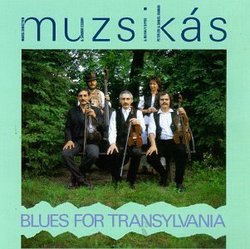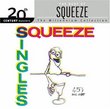| All Artists: Muzsikas Title: Blues for Transylvania Members Wishing: 1 Total Copies: 0 Label: Hannibal Release Date: 7/1/1991 Genres: Folk, International Music, Jazz, Pop Styles: Europe, Continental Europe, Eastern Europe Number of Discs: 1 SwapaCD Credits: 1 UPCs: 031257135023, 031257135016, 031257135047, 4015698882322, 401569888232 |
Search - Muzsikas :: Blues for Transylvania
 | Muzsikas Blues for Transylvania Genres: Folk, International Music, Jazz, Pop
Despite the best efforts of Romania's Ceaucescu dictatorship to make Transylvanian folk culture disappear, it survived at least in part due to the very deprivations (e.g., the lack of electricity and education) that were i... more » |
Larger Image |
CD DetailsSynopsis
Amazon.com Despite the best efforts of Romania's Ceaucescu dictatorship to make Transylvanian folk culture disappear, it survived at least in part due to the very deprivations (e.g., the lack of electricity and education) that were intended to destroy it. This well-known Hungarian quintet began rooting around in the one-time Hungarian territory a decade ago, and their first collection of Transylvanian tunes is a deep and diverse treasure trove of nearly forgotten centuries-old acoustic history. A droning hurdy-gurdy introduces a song about the "damned misery of love"; a pair of fiddles rouse dancers to high-stepping wedding and Christmas dances; a sad string quartet accompanies a song describing "The Time of Autumn" when conscripted soldiers left their villages. And, as with all Muzsikas's albums, Marta Sebestyen's wise and clear and cold voice re-creates another world in your living room. --Richard Gehr Similarly Requested CDs
|
CD ReviewsHeard these songs in Minneapolis; marvelled at the muzsik Roseanne T. Sullivan | 03/20/2002 (5 out of 5 stars) "If you buy this album you are in for a treat
for your ears and your mind.A Hungarian friend of mine took me with her to hear Muzikas while I was in the Twin Cities last month and the group was on tour. The music was a revelation to me.I am half-Hungarian but had never heard Hungarian folk music before, except perhaps through classical music composers who adapted folk songs for their work.My friend has heard Muzsikas perform before many times, some of those times in Hungary. I'm very glad she brought me along to hear them at the Cedar Cultural Center.It was like I had been ushered into a new musical world. During intermission I bought two of their CDs. For the rest of my stay, as I drove around the Twin Cities area I played the CDs constantly in my rental car, trying to comprehend what made the music so unusual and haunting.The Blues for Transylvania is the more intriguing of the two albums I bought, partly because it contains music from the Jews who used to live in the Carpathian mountains in Transylvania. The Jews are gone from there. Many, of course, were killed by the Nazis, and others emigrated. Muzsikas went to Transylvanian weddings, funerals, dances, and collected the music that was left behind.The bass player announced that in the Carpathians there is none of the noise pollution as the rest of us know it in our lives. Only perhaps the occasional sound of "a bear screaming in the forest."With all that silence to fill, the music the Jews in Carpathians created sounds almost Chinese I don't have the training or the right vocabulary for talking about music but the intentional discordancies, the varied meters, the unusual instruments, and the sound of Marta Sebestyen's voice all cast a spell on me. It was alien, but also familiar at the same time. Sure I've heard lots of fiddles and and lots of reels in Irish, Welsh, and American country music. And even though Muzsikas was playing fiddles and playing reels, there were none of the familiar conventions I've grown used to. Just when I thought they would play to the end of a musical line, they would cut it short. The bass player not only laid down the bass line, but in some songs played the melody. It was surprising in many ways.Even the instruments were unpredictable. At one point they produced an instrument that looked like a short bass, and explained that it is played by percussion. The strings are hit instead of stroked--with the exception of one string that is plucked.The varieties of musical experience . . ..And the words. I envy my friend who was able to understand the words. I had to pour over the liner notes to find that they sang about romantic horse thieves, unfaithful lovers, and a cold marriage bed . . .." |

 Track Listings (11) - Disc #1
Track Listings (11) - Disc #1

